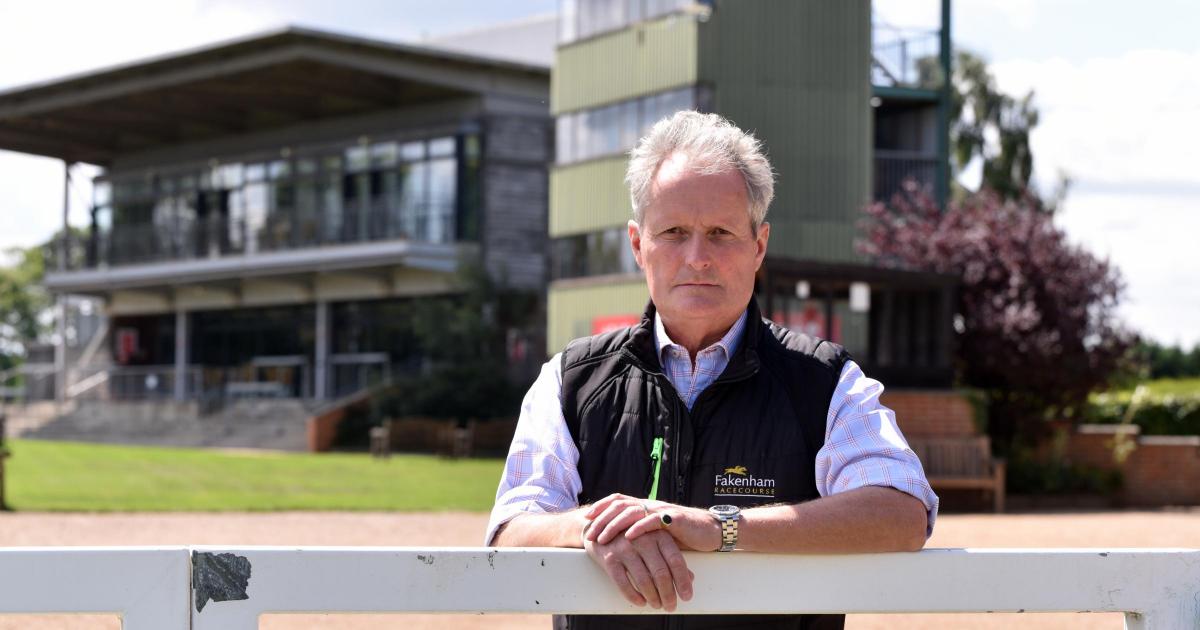The Treasury plans to hike the rate of tax on online betting on racing from 15pc to 21pc, raising it to the same level as online casinos and slots.
But racecourses in East Anglia – home to courses at Fakenham, Great Yarmouth and Newmarket – say the tax increases would be “crippling” for the industry.
The British Horseracing Authority (BHA) forecasts a £330m loss in revenue for British racing over the next five years, putting more than 2,750 jobs at risk in the first year alone.
David Hunter, chief executive of Fakenham Racecourse (Image: Denise Bradley) “It could have serious, dire consequences for British racing,” David Hunter, chief executive of Fakenham Racecourse, said.
“Racing is the second-biggest attended spectator sport after football. It supports a massive amount of people and businesses, particularly in the rural economy.
READ MORE: ‘Adapt or die’…Theme park’s plan to offset soaring energy and wage bills
“From racecourse staff, owners, jockeys, grooms and work riders who look after the horses at training yards, to the breeding industry, veterinary, saddlery and farrier services – if there is not as much income coming into the industry it will have a knock-on effect.
“Racing is doing everything it can to ensure that it doesn’t happen.”
David Hunter, chief executive of Fakenham Racecourse (Image: Denise Bradley)
‘AXE THE TAX’
British horseracing contributes £4.1bn to the economy annually, with more than five million people attending races each year.
The sport is calling to ‘Axe the Racing Tax’, with the BHA warning the hike to 21pc could cost the industry £66m a year.
Mr Hunter said the reduced turnover for betting companies would mean less money coming the way of local racecourses like Fakenham, which heavily rely on the sale of media rights to bookmakers.
David Hunter, chief executive of Fakenham Racecourse (Image: Denise Bradley) “For a smaller course like ourselves, the income that we get from our media rights is the biggest income generator that we have,” he said.
“If that tax is raised it’s an easier pound to make for the online bookmakers to promote their virtual casinos rather than racing.”
READ MORE: From market trader to CEO – how Co-op boss turned £6m loss-making retailer around
More than half of Fakenham Racecourse’s annual income comes from its media rights deals, equating to over half a million pounds a year.
The racecourse attracted just shy of 30,000 visitors last year.
Fakenham Racecourse welcomed just shy of 30,000 people through its gates last year (Image: Denise Bradley) The Norfolk racecourse employs nine people full time and up to 120 casual staff on race days.
Like all businesses, government increases to minimum wages and employers’ national insurances contributions have taken a toll.
“Since this government came into power it has looked at every single opportunity to raise revenues through taxation,” Mr Hunter said.
“But is not looking at the bigger picture or listening to people about the consequences of what they are doing – they don’t seem to care.
David Hunter, chief executive of Fakenham Racecourse (Image: Denise Bradley) “Let’s hope sense prevails and they understand that morally it would be abhorrent if this happened.
“They would be doing something that is detrimental to a world-class, leading, well-established, respected and traditional sporting and cultural institution in this country.
“It would be appalling if something like this – which has been totally ill-thought out – could have such a detrimental effect.
“If it does come into play the consequences will be felt throughout the industry.”
Fakenham Racecourse employs nine people full time and up to 120 casual staff on race days (Image: Denise Bradley) British racing supports the employment of around 85,000 people both directly and indirectly.
“Our last day of racing we had here, which was Ladies Day, the bars and pubs in Fakenham before and after had a bumper day,” Mr Hunter added.
“Racing is deeply intertwined with the local economy.”
David Hunter, chief executive at Fakenham Racecourse (Image: Denise Bradley)
‘GOVERNMENT BOMBSHELL’
Brant Dunshea, CEO at the BHA, described the government’s latest tax “bombshell” as posing the “gravest risks to horseracing the sport has ever seen”.
“The horseracing industry is already in a precarious financial position, and the latest research provides a much more catastrophic forecast than we first thought,” he said.
Brant Dunshea, CEO of the British Horseracing Authority (BHA) (Image: Alan Crowhurst/PA) “We’re talking thousands of jobs at risk across the supply chain, severely impacted towns and communities, and the irreversible decline of the country’s second most popular sport.
“Together as an entire industry, we’re asking the British public for support in calling on the government to rethink this policy and stop undermining a much-loved part of British heritage and culture.
“It’s time to axe the racing tax and back British horseracing.”
